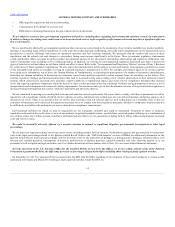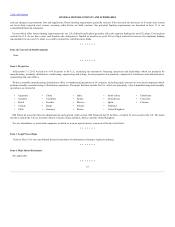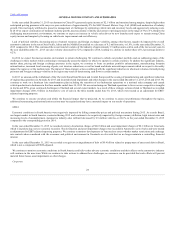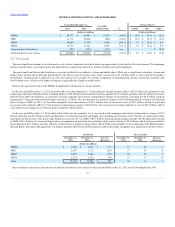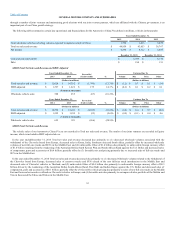General Motors 2015 Annual Report Download - page 27
Download and view the complete annual report
Please find page 27 of the 2015 General Motors annual report below. You can navigate through the pages in the report by either clicking on the pages listed below, or by using the keyword search tool below to find specific information within the annual report.
Table of Contents
In the year ended December 31, 2015 our Automotive China JVs generated equity income of $2.1 billion and sustained strong margins, despite higher than
anticipated pricing pressures with carryover price reductions of approximately 5% for SAIC General Motors Corp., Ltd. (SGM) and moderation of industry
growth. This was largely attributed to proactive management of challenges by optimizing vehicle mix and inventory levels and aggressively reducing costs.
In 2016 we expect continuation of moderate industry growth, macroeconomic volatility and carryover pricing pressures in the range of 3% to 5%. Despite the
challenging macroeconomic environment, we continue to expect an increase in vehicle sales driven by new launches and expect to sustain strong China
equity income and margins by focusing on vehicle mix improvement and cost efficiency.
Lack of political stability, decreasing prices of natural resources and foreign exchange volatility, among other factors, negatively impacted the overall
automotive industry in the rest of Asia Pacific, Africa and the Middle East and led to a decrease of 0.2 million units, or 1.0%, in the year ended December 31,
2015 compared to 2014. This continued the recent trend of a relatively flat industry of approximately 19 million units sold in each of the last several years. In
the year ended December 31, 2015 our sales volume decreased by 5.2% compared to 2014, leading to a decline in market share of 0.2 percentage points to
4.2%.
In 2016 we expect the macroeconomic environment to remain challenging. We continue to refresh our product portfolio and are addressing many of the
challenges in these markets while continuing to strategically assess the manner in which we operate in certain countries. To address the significant industry,
market share, pricing and foreign exchange pressures in the region, we continue to focus on product portfolio enhancements, manufacturing footprint
rationalization, increased local sourcing of parts, cost structure reductions, as well as brand and dealer network improvements which we expect to favorably
impact the region over the medium term. The impact of these strategic actions combined with the significant reduction in wholesale volumes, forward pricing
pressures and foreign exchange volatility in the region may result in deteriorating cash flows in certain markets.
In 2013 we announced the withdrawal of the Chevrolet brand from Western and Central Europe and the ceasing of manufacturing and significant reduction
of engineering operations in Australia by 2017 and incurred related impairment and other charges in the years ended December 31, 2013, 2014 and 2015. We
continue to work on a Southeast Asia transformation plan including the transition of our Indonesian operations to a national sales company and ceased
vehicle production in Indonesia in the three months ended June 30, 2015. We are restructuring our Thailand operations to focus on our competitive strengths
in trucks and SUVs given continued challenges in Thailand and several export markets. As a result of these strategic actions related to Thailand, we recorded
impairment charges of $0.3 billion in Automotive cost of sales in the three months ended June 30, 2015, which were treated as an adjustment for EBIT-
adjusted reporting purposes.
We continue to execute our plans and within the financial impact that we projected. As we continue to assess our performance throughout the region,
additional restructuring and rationalization actions may be required and may have a material impact on our results of operations.
GMSA
Economic conditions in South America were negatively impacted by falling commodity prices and political uncertainty during 2015. As a result Brazil,
our largest market in South America, contracted during 2015 and continues to be negatively impacted by foreign currency deflation, high interest rates and
increasing levels of unemployment. Automotive industry sales in Brazil decreased by 0.9 million vehicles, or 26.6%, in the year ended December 31, 2015
compared to the corresponding period in 2014.
In the year ended December 31, 2015 we recorded currency devaluation charges of $0.6 billion and asset impairment charges of $0.1 billion in Venezuela,
which is experiencing a severe economic recession. The devaluation and asset impairment charges were recorded in Automotive cost of sales and were treated
as adjustments for EBIT-adjusted reporting purposes. We continue to monitor developments in Venezuela to assess whether market restrictions and exchange
rate controls when considered with the economic and political environment in Venezuela evolve such that we no longer maintain a controlling financial
interest.
In the year ended December 31, 2015 we recorded a net gain on extinguishment of debt of $0.4 billion related to prepayment of unsecured debt in Brazil,
which is not a component of EBIT-adjusted.
We continue to monitor economic conditions in South America and believe that adverse economic conditions and their effects on the automotive industry
will continue in the near term. While we continue to take actions to address these challenges, no assurance can be provided that such efforts will prevent
material future losses, asset impairments or other charges.
Corporate
24


